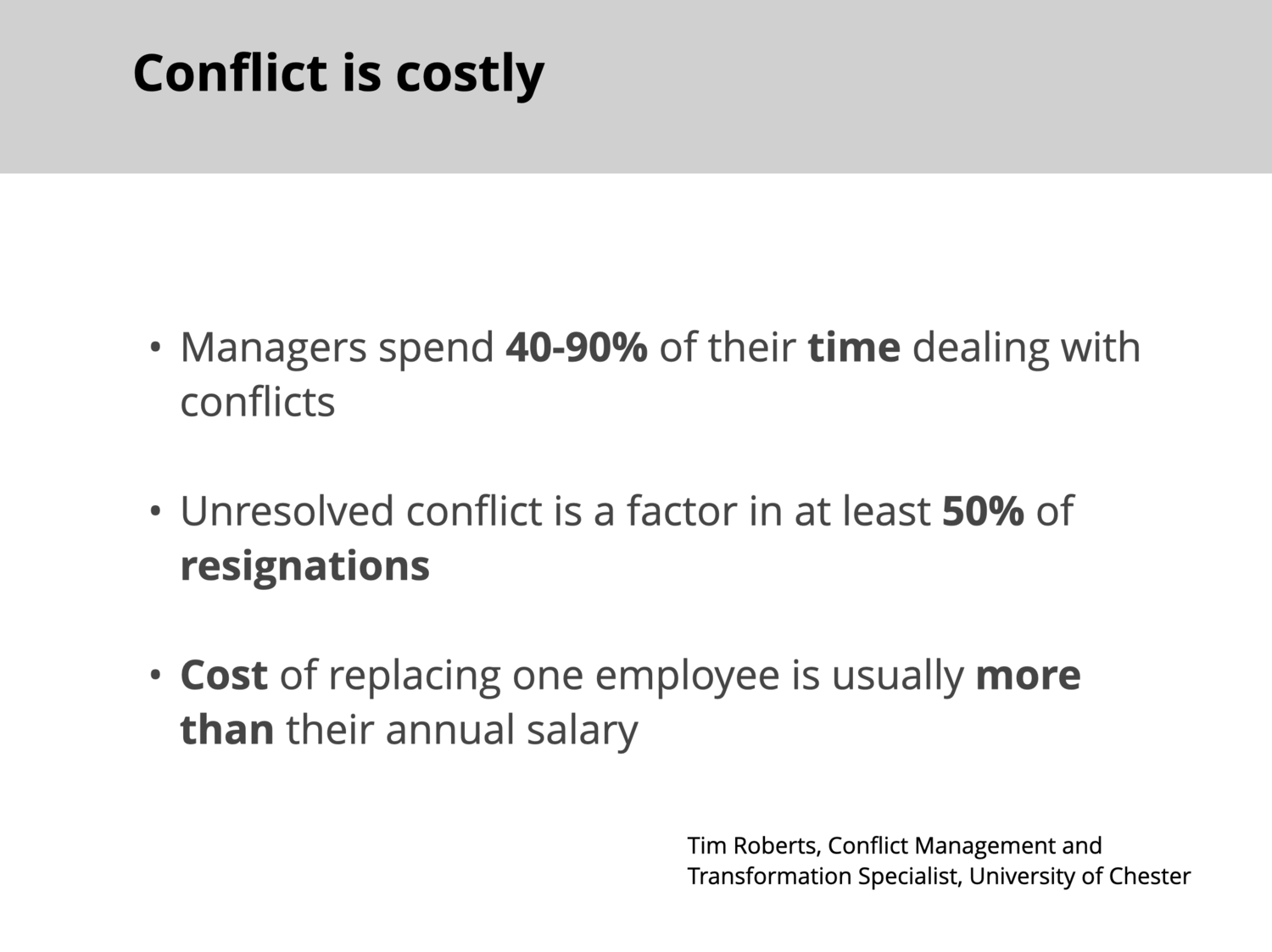Conflict is not the secret sauce to building a great product
Let’s start with a scenario I’m sure many of you have experienced.
Meet Sue and Tom.
Sue is an engineering lead on a team and Tom is the product manager. They work at an AI start-up and have recently been focused on a new piece of functionality that is going to put their company on the map… It’s going to disrupt the entire industry! The potential is HUGE!
Not surprisingly, Tom, Sue and team are under a lot of pressure to get this world-changing product out the door. Tom is pushing to meet a certain date to beat competition, while Sue is pushing back because of concerns over code quality. It’s the age-old tension between product and engineering: shipping to meet market demands versus the desire to deliver with quality.
In today’s team meeting the debate escalated into an argument. It can happen so easily. Tom’s casual shrug of a shoulder or roll of the eyes, which Sue finds insulting; a few words from Sue that Tom sees as hostile. And we’re off — conflict ensues!
Our reactions to conflict are instinctive
From the moment that critical comment is muttered or eyes rolled, our brains set into motion a series of instinctive, neurophysiological responses that are designed to warn us that danger is upon us.
We’ve all experienced it: our breath becomes more shallow, our hearts beat faster, our mouths get dry, our palms get sweaty, our legs and hands tremble. And while our bodies are going through their instinctive cycles, our emotions give us basically two choices: get angry and fight back or run. It’s fight or flight — reactions aligned to instinctive behaviours which have remained constant since early cavewomen and cavemen.
How do organisations deal with conflict? They Exploit or Avoid!
While we’re no longer living in caves, our reaction to conflict and danger has not evolved; we’ve simply adapted our reactions to our environment.
From my experiences, when it comes to dealing with conflict, organisations adopt one of two models:
Exploit — Organisations that “exploit” conflict, believe it is a secret sauce to building a great product or business. These organisations see conflict as the lifeblood of success, and as evidence that their employees care deeply about their work.
Avoid — On the other side of the spectrum are organisations that “avoid” conflict. They sweep tension and conflict under the rug. You can hear in the hallway whispers of “nothing to see here” as any issue or spark of conflict is put to the side and hopefully forgotten.
Far from ideal responses, these modelled approaches show how little progress has been made in dealing with conflict at work. And the financial ramifications of exploiting or avoiding are even more striking.
Can you imagine all the things we could accomplish if we — and our organisations — had practices in place to resolve conflict instead of exploiting or avoiding?
Conflict is not the “secret sauce” for a great product
As our opening scenario with Tom and Sue shows, product management has its own breed of conflict that is created naturally when you bring together core members of our traditional cross-functional teams: Engineering, Design and Product.
These functions have competing goals — technology strives for quality code and infrastructure, design strives for an optimal experience, and product looks to meet customer, market needs, and more. Sometimes competing, sometimes overlapping, these goals always create tension.
When I first started out in product management I was told that this tension was good, because through it we deliver a product that is the outcome of all three functions pushing each other to the limits.
I used to agree with that and just expect tension and conflict as part of the development process, but not any more.
Now I say that this great natural tension is a short-sighted condition that — in the vast majority of occasions — creates a legacy of financial, emotional and organisational waste. Conflict is not the secret sauce to delivering a great product.
Conflict is Not Going Away, but we can do something about it
Here’s the deal. Conflict is not going away. There will always be tension at work. There is no magic spell or piece of advice I can give you that will make your workplace a haven of peace.
However, I believe that we as product managers are perfectly positioned to lead the change that our organisations need to move us away from Exploit and Avoid and toward an environment of productive conflict resolution.
How? By changing our own mental model about conflict, and realising that managing conflict is a skill that is essential to product management. Just like learning how to build a roadmap or do A/B testing, we can learn how to manage and de-escalate conflict.
How do you deal with conflict now?
Peter Drucker, pioneer in leadership and management, said: “You cannot manage other people unless you manage yourself first.” In other words, until you get to know yourself well, you won’t have the skills or competencies needed to lead and manage.
One way to understand your relationship with conflict now is through the Thomas-Kilmann Conflict Instrument — a tool designed to “measure a person’s behaviour in conflict situations.” Created in 1974 and taken by over eight million people to date, it’s now an online test that you and your team came take in about 15 minutes. The outcome will measure how you deal with conflict based on five different modes: competing, collaborating, compromising, avoiding or accommodating.
Build methods of conflict resolution into your teams ways-of-working.
Once you have a stronger sense of how you and your team deal with conflict, develop ways that you can build conflict resolution into your ways of working. For example:
Create a safe space for issues to be discussed and resolutions proposed. I’ve seen sessions called “beef hour,” or even weekly gatherings on Friday called “venting Friday”. It doesn’t matter what you call it, but the idea is to dedicate time to talk about tension in your team and come up with resolutions to resolve it (this is the most important part). This is not designed to be a “bitch session” or a “retro” but time to have open and honest conversation without finger pointing and an opportunity to decide as a team how to move forward.
Agree to basic principles of behaviour in times of conflict. For example members agree to act in good faith at all times — this means not spreading rumours and taking full responsibility for actions.
Training in a method of conflict resolution. The philosophy of Non-Violent Communication (aka Collaborative Communication) by Marshall Rosenberg is a popular option. Created in the 1960s from Rosenberg’s work with civil rights activists, Non-Violent Communication teaches four key components to help improve relationships and communications. The philosophy has been used to defuse gang fighting in New York, as part of the Middle East peace process, and in homes and offices across the world. Training is offered globally. I highly recommend learning more about NVC and it’s applications to daily life.
Ok, you’ve done some work on yourself and your own relationship with conflict, and your team has put in place ways to deal with conflict as part of ways of working. Now the conflict has happened. The next tips will help you deal with conflict in real time.
Timely Dialogue
The timing for a conversation between the conflicting parties is delicate. Don’t bury your head in the sand and wait too long to talk through the tension, but at the same time don’t force the issue if people are tired and stressed. Be aware of when to have a conversation — make sure people have space to breathe and cool off, but don’t let that drag on for days.
Know your audience
If you’re in the midst of conflict, be mindful of your communication style. Consider the message you want to relay and what words and tone might have the best chance of actually being received well and productively. Check out Dr. Jody Foster’s book, “The Schmuck in My Office,” where she profiles the types of people we all find hard to work with and provides advice to build a better working relationship.
Consider the details
Talk face-to-face — don’t send that email that you were up all night writing to the other person, telling them how angry and hurt you are. Don’t fight it out on Slack. Be a grown up, have a face-to-face conversation.
Go to a neutral place to talk — a coffee shop or location outside the office is recommended if possible
Prioritise and start with the “easiest” challenge first — Unlike product development where we often start with the most challenging piece of functionality first, start easy here. If you can come to an agreement on a seemingly small issue you can build some confidence and trust to move on to the more challenging topics.
Equal time to talk — To help get your dialogue moving, try starting out by speaking in rounds. For example, agree to a certain amount of time for each person to talk about their grievances, say two minutes. Do as many rounds of two minutes as you need. The idea is to provide non-interrupted space to speak. Knowing that you won’t be interrupted can give you a liberating sense to get off your chest what you need and just talk.
Ask for help via mediation — Sometimes we need a bit of assistance in dealing with the conflict at hand — and that’s when it’s time to bring in a third party. It could be a manager, trusted coach or colleague whom you both feel comfortable with helping you work through the conflict. When acting as a mediator previously, I’ve tried the NVC approach from Rosenberg. He focuses on two questions: What do each of you need? What would you like to ask of the other person relating to those needs? While these questions may seem easy, they actually push participants to identify where the tension is in direct conflict with their own needs, and what strategies those involved can agree to in hopes of preventing a repeat pattern. It may take a lot of time to get to the real need, but once you do, strategies tend to flow more easily.
Celebrate success — Being able to resolve conflict makes us feel more empowered and proactive. Acknowledging and celebrating that feeling goes a long way in furthering your practice to shifting your mental model about conflict.
The key is to keep learning
Conflict is not bad, but our inability to manage and resolve it is costing us dearly — financially, emotionally and organisationally. With continued investment in personal development, and focus on building our Product EQ, we can build our conflict management skills and see the healthy outcomes that conflict can truly bring.
Here’s some reading to get you going:
Time to Think, Nancy Kline
Nonviolent Communications, Marshall B. Rosenberg
Resolving Conflict at Work, Kenneth Cloke & Joan Goldsmith
Emotional Intelligence, Why it can Matter More than IQ, Daniel Goleman
The Schmuck in my Office, Dr. Jody Foster
Subscribe to Product Leadership Essentials
Sign-up to my email newsletter to learn more about how to better understand and build your authentic Product Leadership skills.




